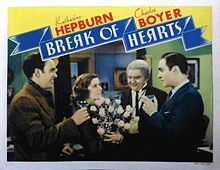Plot
Franz Roberti is a passionate and eminent musical conductor; Constance Dane is an aspiring but unknown composer. She wants to see his concert, but it is all sold out. When she sneaks into his rehearsal he is smitten by her devotion and gets his orchestra to get it right as they play just for her. Constance marries Franz: he says she is "a most exciting creature" and she has been in love with him for a long time (i.e., "since late this afternoon").
Not long after they get married Constance finds Franz having dinner with a female friend. So Constance responds by going out with her own friend, Johnny Lawrence. Johnny wants to marry Constance, but she cannot forget her husband. Franz has been hitting the bottle and pretty much throwing away his career, although exactly which of his many sins is driving him to drink is not really clear. Fortunately, Constance has been working on her concerto.
Constance grows bitter at Franz's drinking and apparent infidelity, and tells him at a New Year's Eve party that she has learned from him and plans to live it up too. She is clearly not really enjoying dancing with other men, but Franz loses it and shows up late and drunk for a concert. He collapses on the podium as the orchestra tries to play a Bach piece with his increasingly erratic guidance; Constance, in the audience, is overcome by pity and rushes to his dressing room, but he furiously invites all the other men there to socialize with her, and walks out.
Constance goes to Reno and gets a divorce. Johnny shows up on the train on the way back, and proposes to her, accepting the fact that she does not love him but only likes him. She accepts, and they plan to sail to Europe for a honeymoon. But Franz and Constance's friend Professor Thalma tells Constance about Franz being down and out. She goes to the bar where he is collapsed, and brings him back to consciousness by playing the music they shared on the bar piano. She takes him home and gets medical attention for him, and, when Johnny comes, tells him nothing, including her own music, is as important as caring for Franz. Johnny sadly accepts this and goes.
Later, a revived and healthy Franz triumphantly finishes conducting Wagner's Meistersinger overture, with Constance watching him from the wings. When he walks off stage and embraces her, he tells her the applause they can hear from the audience is really hers.
Reception
Writing for The Spectator , Graham Greene praised the acting of Boyer and Hepburn which he described as "talented enough to keep some of our interest even in a story of this kind". Concerning Hepburn in particular, Greene observed she "always makes her young women quite horrifyingly lifelike with their girlish intuitions, their intensity, their ideals which destroy the edge of human pleasure". [2]
This film made a slim profit of $16,000. [1]
This page is based on this
Wikipedia article Text is available under the
CC BY-SA 4.0 license; additional terms may apply.
Images, videos and audio are available under their respective licenses.
